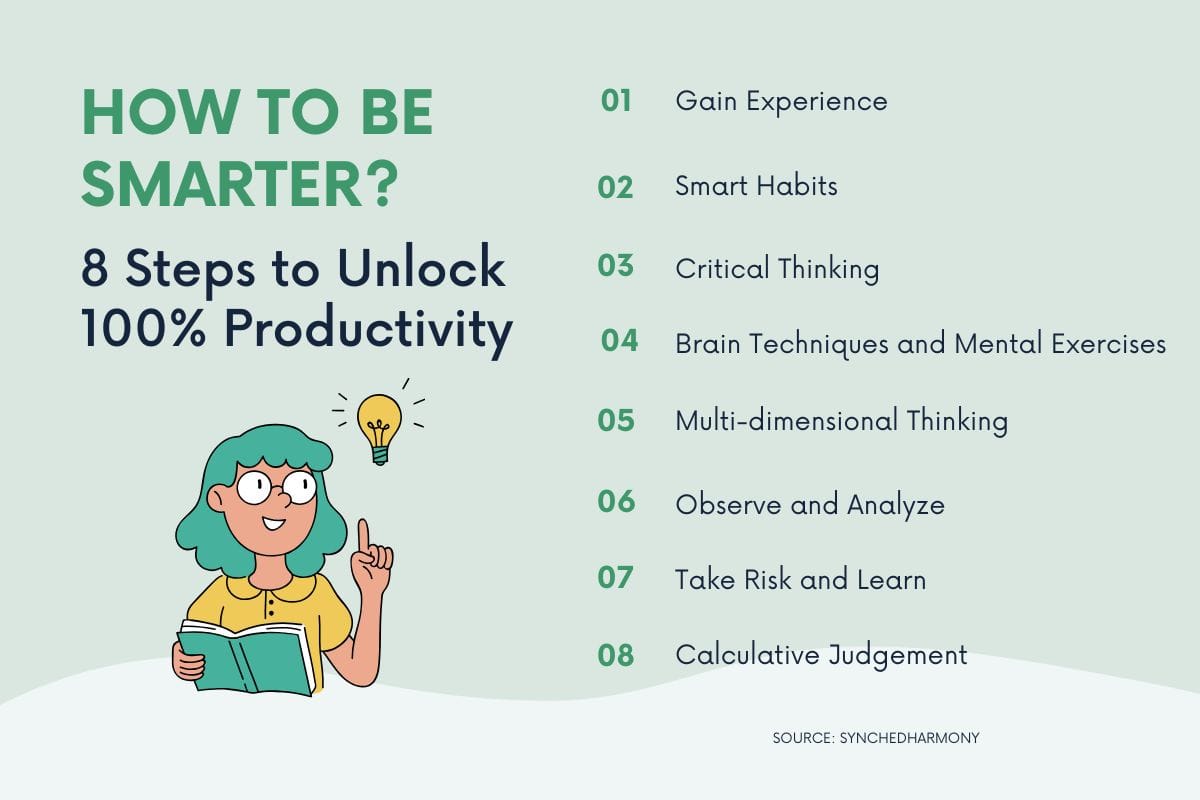In this Artificial Intelligence (AI)-driven era, people have already become quite smart, and as a result, the competition has become even more intense. Now, if you want to stay ahead of the game, it’s essential to become smarter than smart.
The main focus of today’s article is on how to be smarter or how to get smarter. Here, we will discuss in detail some key insights that will help you transition from being smart to becoming even smarter.
You must have often heard people say, “Do smart work instead of hard work.” However, I don’t completely agree with this statement, because you can’t truly do smart work unless you have a thorough understanding of the task at hand. To become smart, we can certainly make use of AI tools, various forms of guidance, and mentorship programs. But if your goal is to go from being smart to becoming smarter, then your experience and hard work will play a significant role in it.

Understanding Intelligence, Brain Power, and Cognitive Functioning
Intelligence[1] has been defined in many ways, but the simplest way to describe it is the ability to perceive or infer information, and to retain it as knowledge to be applied to adaptive behaviors within an environment or context.
Information and knowledge are two closely related terms. Information refers to any data or insight that enlightens your mind. Once you fully grasp and understand that information, it becomes a part of your knowledge bank. Later, you use that very knowledge as information to make important decisions—decisions that help you become smarter.
Brainpower can simply be understood as your ability to think, grasp, and understand things to build knowledge and make decisions. It has a direct relationship with intelligence, as the ability to perceive or infer information may vary from individual to individual. A smart person may perceive information differently from the average person, and the smarter one will use their brainpower and intelligence to outsmart the rest and be one step ahead of the game.
Cognitive Functioning[2] refers to the ability to think, learn, and remember things. Now you must understand the relationship between intelligence, brainpower, and cognitive thinking, that Intelligence depends on your brainpower and cognitive thinking, and how well you can correlate things that you learn and the things that you remember in the form of knowledge. This correlation plays a key role in differentiating between the smart and the smartest.
Smart people focus on learning and upskilling themselves, whereas the smarter ones will try to combine their learnings with their experience. They will not simply learn to upskill; rather, they will learn to enrich their experience, which helps them in better decision making. Experience will always be beyond the boundaries of the books that will provide an edge to the smarter ones.

How to Be Smarter – What Can I Do To Become Smarter?
Gain Experience
I often say that you can become smart with your moves, but you become smarter with your experience. Often, smart people try to avoid hard work. Their focus is usually on optimizing the way a task is done so that it can be completed as quickly as possible. They invest all their energy into that without thinking much about truly understanding the work or gaining expertise in it.
On the other hand, a smarter person first works on gaining expertise in the work and then thinks about optimizing the process. So, to become smarter, it’s essential to develop the kind of expertise that comes from hard work, followed by smart work.
Smart Habits
Adopting smart habits and including them in your daily routine is crucial to becoming smarter. Certain habits like discipline, punctuality, time management, schedule building, mental exercises, focus-building meditation, and long-distance running can help train you to transition from being smart to becoming smarter. Rigorous training and mental strength play a crucial role here.
If you are looking forward to adopting smart habits in 2025, here is an excellent read to fuel your motivation to become smarter.
Must Read: 10 Habits That Will Make You UNSTOPPABLE in 2025
Critical Thinking
As cited in Wikipedia, Critical Thinking[3] is the process of analyzing available facts, evidence, observations, and arguments to make sound conclusions or informed choices. It involves recognizing underlying assumptions, providing justifications for ideas and actions, evaluating these justifications through comparisons with varying perspectives, and assessing their rationality and potential consequences.
Decisions made based on critical thinking are often smart decisions, but smarter people don’t just rely on facts, evidence, and observations to make choices; rather, they leverage their personal experience and gut feeling in critical thinking.
For example, using AI tools to create content is smart, but writing original content and optimizing it by leveraging AI tools is a smarter move that will put you ahead in the Google page ranking.
Brain Techniques and Mental Exercises
Brain techniques are brain training techniques to help you get smarter. Puzzle solving, solving complex mathematical problems, stress handling, bluffing with the mind, multi-tasking, and continuous improvement are some very effective techniques to train your brain.
The difference between being smart and being smarter also lies in the ability to handle pressure. Often, even smart individuals may choke under pressure. But a smarter person trains themselves to handle high-pressure situations and outsmart others when it matters the most. These brain techniques put your mind through various challenging and pressure situations to help you become smarter.
Bluffing your mind is a mind-diverting technique to keep you focused when your mind starts thinking of giving up.
Multi-dimensional Thinking
Multidimensional thinking involves considering a situation from diverse angles and understanding the perspectives of each view. It requires looking at situations from different viewpoints and grasping aspects that your limited perspective about a particular situation might not be able to comprehend otherwise. It requires understanding the context more comprehensively and comprehending the relationship between different perspectives.
Smarter people rely heavily on this ability to think and outsmart others. Instead of viewing a situation from a limited perspective, they tend to view it from all angles to get a holistic picture.
Must Read: Multidimensional Thinking – A Powerful Guide to Problem-Solving
Observe and Analyze
Smart people are observers; they speak less and observe more so that they can identify opportunity areas and uncover weaknesses of their competitors, which helps them outsmart others. But smarter ones go beyond their limited perspective to observe and analyze others. They use a rich blend of their personal experience and multi-dimensional thinking to overanalyze and observe things that even the smart ones would skip at first glance.
They consider every scenario that has even a slight possibility of occurring and plan on how to cope with such situations. They don’t just rely on Plan B; rather, they would go to the extent of developing a Plan C, Plan D, and so on to limit the damage.
Take Risk and Learn
These individuals possess a strong risk-taking ability and believe in continuously pushing their limits. Their desire for constant improvement is so strong that even the risks involved in pushing the boundaries can’t hold them back.
To gain real experience, one must go beyond existing limits—that’s how new limits are discovered and unlocked. This is where even smart people often restrict themselves, and that becomes a key differentiating factor between being smart and being smarter.
Calculative Judgement
Along with risk-taking ability, having a sense of calculative judgment is equally important. Even if this judgment isn’t always 100% accurate, it should be based on your experience and gut feeling—there should be a fair chance of effectively dealing with the risks involved.
Many times, smart people fail to make such calculated judgments under pressure. But this is where smarter individuals gain the upper hand—because they’ve trained themselves to make excellent calculative decisions even in high-pressure situations.
How To Be Smarter at Work

The work environment can be very competitive nowadays, with AI taking over most of the tasks. Automation has led to a lot of job cuts, and essentially, the skills that were in great demand a decade before have now been completely wiped from the market. It is important to be ahead of the game and become the smartest one in the office. Here are 10 key points on how to be smarter at work.
Attention to Detail
Attention to detail is perhaps one of the most important qualities in the workplace. You must stay focused on what is being said and discussed, and make sure you understand it thoroughly. Many times, people don’t grasp the context or misunderstand the expectations completely because they lack attention to detail. For you to become smarter at the workplace, paying attention to detail should be your topmost focus, especially on calls and meetings.
Ask Relevant Questions
Your attention to detail will automatically improve if you start asking relevant questions at the workplace. You must understand the context in depth before you start diving in and contribute to the work. To understand the context, ask questions starting with What, How, Who, When, and Where until you get a complete understanding of the task at hand.
Trust me, you will always have an edge over your peers if you get the right context of the task. Having in-depth clarity of the work can help you deliver the task in a smarter way as compared to your peers.
Curiousity
You can only ask relevant questions when you generate a curiosity to learn new things. Generate an inner urge to understand things from all perspectives, be curious to find out what is happening, why it is happening, what the triggers are, what’s in it for you, what’s in it for others, and other things that help you generate an interest in that work.
A curious mindset will bring all your attention to the work and which ultimately helps you deliver the task with increased productivity. A smarter person will try to deep dive into every topic that he doesn’t understand and his curiosity will not let him rest until he finds the complete picture.
Lead by Example
Smarter ones don’t just talk, they lead by example. Instead of saying, “We must build a collaborative work environment!” they focus on building a collaborative culture by leading initiatives and activities that align with team building and collaboration. They focus on doing things differently, but in a better way, thus setting an example for others to follow to follow his footsteps.
Out of the Box Thinking
Smart people don’t just rely on the traditional way of working; rather, they utilize their knowledge and experience to devise new ways of working. They develop a good out-of-the-box thinking ability through curiosity and multi-dimensional thinking.
A smart person will not just focus on completing the task; rather, he will focus on gaining expertise on that work so that he can think about ways to complete that task sooner in a more efficient and highly productive way.
Manage Tasks and Deadlines
A smart person often focuses solely on completing the task before the deadline. But a smarter person approaches even the smallest task like a project manager.
Before starting any work, they thoroughly analyze the task—understanding the expectations, estimating the time required, evaluating whether the deadline is realistically achievable, identifying dependencies and potential blockers, exploring if there’s a better way to approach the task, and assessing the risks involved if an alternative method is used.
Upskill
A smart person might try to learn the skill that is currently in demand—the “skill of the present”—to get ahead of others. On the other hand, a smarter person not only focuses on mastering the present skill but also invests time and effort in learning a skill that has the potential to become the “skill of the future.”
As an example, people are upskilling themselves on AI development because everybody wants to work on AI in today’s era, but the smarter ones are also focusing on prompt engineering, which is a skill required to train the AIs.
This is a wise approach because, if everybody is focusing on AI development, then there should be someone to train those AIs.
Focus on Gaining Experience
Smart people often earn money quickly, but smarter people believe in gaining experience, because when your experience is strong, money naturally follows.
Bruce Lee, one of the greatest martial arts artists of his era, once said something very wise: “I fear not the man who has practiced 10,000 kicks once, but I fear the man who has practiced one kick 10,000 times”
This holds even in the professional world. When a person gains real experience, they instinctively find smarter and more efficient ways to complete a task. Experience builds mastery, and mastery leads to smarter work.
Boss is Always Right
The difference between being smart and being smarter is that a smart person works just to please the boss, and they know how to do it well.
On the other hand, a smarter person clearly understands the boss’s expectations and suggests the best possible ways and outcomes accordingly. Instead of blindly agreeing with the boss, they offer thoughtful alternative solutions that naturally earn respect and leave a lasting impression.
Time Perfect Switch
A hardworking person often limits their thinking to working more and climbing the ladder within the same company and work culture by aiming for promotions. A smart person, on the other hand, polishes their skills and times the market well to switch jobs for better opportunities.
But smarter individuals don’t believe in switching jobs just for money. They prioritize the quality of work and work-life balance over a higher paycheck. No matter how complex or messy the work may be, they always find a smarter way to handle it. They gain mastery in what they do, continuously upskill themselves, and plan their job switch so perfectly that they never find themselves short of job offers. They believe in growing with a purpose and clarity.
Conclusion
To conclude, the difference between being smart and being smarter lies in the distinction between experience and intelligence. A hardworking person can become smart, but the journey from smart to smarter involves many factors—among the most important are building experience and adopting smart habits.
In this article, we thoroughly explored the correlation between intelligence, brain power, and cognitive function, and we discovered how smarter individuals make better use of these traits compared to others. We also explained that while smarter people possess a greater risk-taking ability, their actions are highly calculated, relying on gut feelings and experience. Finally, we discussed 10 key strategies that can help you become smarter in the workplace.
Start your journey today!
So, thinking of transitioning from smart to smartest, subscribe to our vibrant community Synched Harmony to get more inspirational and motivational content and related blog posts.
References
- Emotional Intelligence from 17th Century to 21st Century: Perspectives and Directions for Future Research – Radha R. Sharma
- Cognitive Health and Older Adults
- Brookfield, Stephen D. (1987). Developing Critical Thinkers: Challenging Adults to Explore Alternative Ways of Thinking and Acting. Open University Press. pp. 13–14. ISBN 978-0-335-15551-4.
- Bruce Lee – I fear not the man who has practiced 10000

Greetings! I am the voice behind the thoughts presented on Synched Harmony. As an ordinary individual, I strive to live a life dedicated to achieving inner peace and serenity by cultivating harmony within and making difficult aspects of life work together in sync during tough phases of life. Life becomes much easier if we open ourselves to small changes and respect each other’s personal boundaries, creating space for shared happiness.
